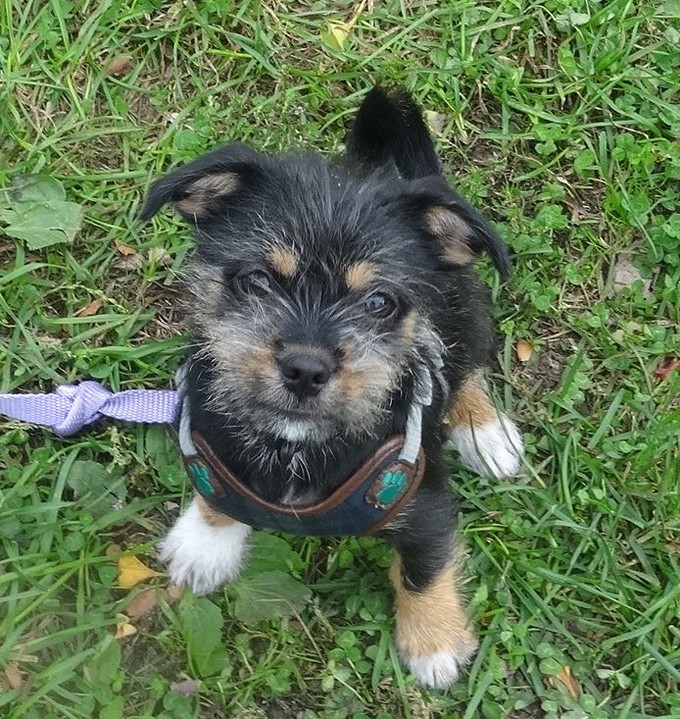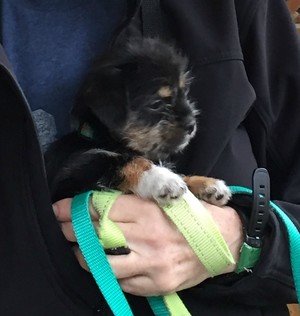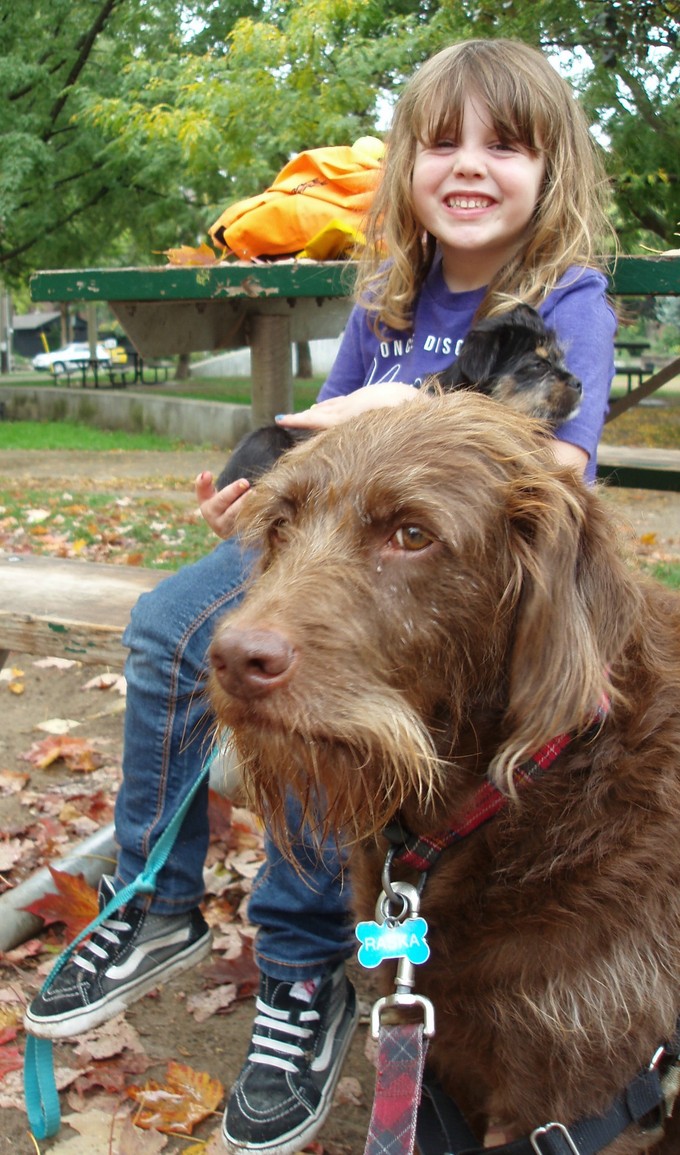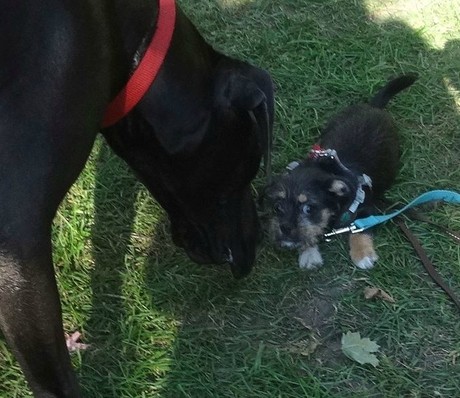The Pushkin Papers: Two

As I keep telling everyone, including Pushkin herself, Push is my first little dog. "Pushkin, there are your people!" I say, whenever we see a squirrel. But she's not so different from larger puppies: she rolls in the laundry room lint piles, and carefully examines the ants on the kitchen floor before she eats them. She enthusiastically assaults you with her tongue — and her teeth, if she can get away with it.
Where the air is sweet
The problem of introducing a five pound dog to two fifty pounders is new to me. Integrating Pushkin feels like an episode of Sesame Street. Mostly because I'm using a relentlessly upbeat tone: it's my HEL voice (Happy, Excited, Loving), and it's not one hundred per cent sincere. I'm the kind of person who prefers books like "Healing Through Your Dark Emotions" and "The Upside of Your Downside".
Pushkin buys my HEL routine, but Nots and Mack Crack are not sold on it, or on the newest muppet. One of these things is not like the other. Pushkin weighs a tenth of what they do, but they're very anxious around her.
To avoid Push Traumatic Stress Disorder, I am running an experiment (too bad I'm not in high school, with a project due) in gradual exposure through the five senses. Mack Crack and Nots are allowed to see, smell, and hear her. Touch and taste are saved for later. Inside, Pushkin's behind a barricade, outside, she's in a satchel. Notley refuses treats when she's too near Push, and stares obsessively at her head whenever it pokes out of the satchel. McCracken stays as far away as his leash permits and looks straight through her: puppy, what puppy?
In half and hour, McCracken and Nots will smell every trace these guys have left behind
Scent is their key connection to her. One afternoon I take Nots and Mack Crack out for a walk and they stop dead, right in the place where Pushkin and her pal Sylvester were playing earlier. They sniff voraciously, covering every inch of the side walk and turf, satisfaction expressed in every tail wag.
After ten days or so, when they're more used to her (a cookie every time they don't react to her squeaks and yips, much praise whenever they look at her and stay calm), I take Pushkin out of the satchel and let her walk around in front of them on the sidewalk. Cautious butt sniffing, some friendly wagging. We are on our way to becoming a pack.
Good thing, as I now refer to my tone as HELO. The 'O' is for Overtired.
Walking the Pup
At first when I carry Pushkin and walk the others, I'm totally uncoordinated. By the time I've got the hang of it, she's rejected the satchel — unless it's raining; then her resistance evaporates. If I bag her against her will, she resists with strenuous kicks and small, ominous growls.
When I'm walking the three of them, Pushkin's thought bubble usually goes like this: "I can walk! I can walk! Put me down. Thanks. This is great... I'm stalling. I'm stalling. I'm flattening myself to the sidewalk. I'm doing my dead-squirrel-carcass routine. Don't pull!
"Oh... Oh. You're picking me up. Shit."

Pushkin, carried away, again
Though mostly she motors under her own steam, I carry her much more often than I carried my larger dogs as pups (never). Push is a squirmer, and this makes me nervous. One of my previous dogs, Foo Fighter, was dropped on her head as a pup — not by me. Foo was a very freaked out young dog, for reasons other than her head-first crash, but... I do not want Pushkin's tiny head to take a pavement plunge. When people hold her, I explain that if they drop her, I'd hate them, irrationally and forever.
Pushkin catches on to stuff quickly (sit; touch; oops, better not try that, there's Mason's weird warning voice again), but transitions very slowly. I thought that McCracken, with his five-second threat-assessment stoppages, was poky. But Pushkin puts on the brakes for the first seven minutes of every walk. The same seven minutes that Notley spends hysterically excited to be ON A WALK! Pushkin is learning there are pros and cons to living in a pack; you're not on your own time.
The well-named pup
Pushkin's name popped into my head when she was still an abstract "maybe a little dog next" concept; it's a good name for a small dog, cute yet commanding. The writer Pushkin was a paradox, a radical reformer and a royal court social climber. At this stage, puppy Pushkin is also both a scrapper and a suck-up. She hangs on to toys in the face of bigger (gentler) dogs, but shows great deference to McCracken. She shows much less respect to me, unless I wave a cookie under her nose, or shut a door in her face. Then she pivots from bossy to obsequious instantly.
Also, regarding her namesake, I've told her she's not allowed to duel (or die prematurely), and that if anyone is going to write poetry, it will be me.
Pushkin can be a scrapper
The social climber

Pushkin is cuddled, while playmate Raska looks askance
Pushkin is not yet permitted to play with Notley and McCracken. She's not socially deprived, though. A large rotty mix, Sasha, tolerates her hit and run antics, and Raska, a big aussielabradoodle, plays tug with her. Her best friend is closer in size, a havanese named Sylvester. They wrestle non-stop in parks, in my closet-sized kitchen, and in the middle of major intersections. Pushkin, and my HELO voice, are getting good work outs.
The cling-on
I imagine that when writing, a solitary activity, Alexander Pushkin could handle being in a room of his own. My Pushkin can't. Pam, human companion to a yorkie, warned me about this, referring to "needy-little-dog life. "
When McCracken was a pup, I didn't leave him alone, uncrated, because I was afraid of what he might get up to, like gnawing all the toxic paint off the baseboards. I don't leave Pushkin alone, uncrated, because she's afraid of what I might get up to, like having a bath without an audience. An audience who likes to gnaw all the toxic paint off the baseboards.

Pushkin occasionally needs reassurance
Every time I leave her in her den (the closet-size kitchen), she wails, then pees or poops, and not on her pad. If her isolation anxiety is not just a phase, I see a tedious Calming Protocol in our future. Fortunately, she does settle in her crate after only five minutes or so of protest. She goes from indignant, to plaintive, to asleep.
For a little dog, Pushkin can sigh very heavily.
Comments: To avoid registering with Disqus, click on join the discussion and in the name field at the bottom of the form check "I'd rather post as a guest." A name and email address are still required.